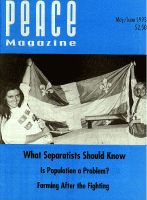
Peace Magazine May-Jun 1995, page 31. Some rights reserved.
Search for other articles by Yevgenia Issraelyan here
Eric Fawcett; Hanna Newcombe (editors) Toronto: Science for Peace and Dundurn 1995
I wish I could read this book in Russian. I wish Russian readers could read it. I wish Russian scholars would write a book with such a broad perspective. Twenty-five distinguished Canadians made a contribution in the 50th anniversary year of the United Nations by giving their answers to a question posed by Douglas Roche: Are we facing "a wondrous dawn or a dark night" of the world community?
The end of the Cold War has liberated the United Nations from the superpower confrontation and raised new expectations for strengthening peace and international security. However, the U.N. urgently needs reform and revitalization to respond to new economic, ecological, and ethnic challenges. This view is shared by all the authors. However, each of them has his or her own insight into this evolution aimed at turning the U.N. into a real force for a rules-based international system.
As Anatol Rapoport puts it, all the proposed reforms of the United Nations converge on the theme of restricting nation state sovereignty. The main focus of reform is on transforming the U.N. into a global organization of people, rather than of states. Hanna Newcombe suggests introducing weighted voting based on such factors as population and wealth (p.89). Other proposals to democratize the U.N. relate to the expansion of the role of non-governmental organizations (NGOs) and to the creation of a parliamentary assembly which would consist of selected members of national legislatures.
The second pathway of reforms--the possible changes in the U.N. management of international peace and security--are analyzed by several knowledgeable authors who, according to Henry Wiseman, have succeeded in giving a variety of perspectives on these issues. Geoffrey Pearson's historical study of peacekeeping leads him to conclude that some of the 18 new peacekeeping operations since 1988 have greatly expanded the traditional U.N. functions of observation and warning. He points to the challenge to give these precedents institutional form and political legitimacy and shares the conviction that Canada can make a unique contribution if her political leaders can muster the resources and public support to do so (p.111).
The lessons of peacekeeping and of the U.S./U.N. failure in Somalia raises another question: What are the criteria for U.N. intervention? John Polanyi assumes that, if there are no other solutions and all the means are exhausted, "force should be used according to prescribed guidelines, as a last resort, and to the least extent." However, K. Venkata Raman warns that not all specific conflict situations can be resolved by "military muscle." He suggests a reconsideration of fundamental legal principles in relation to the peacemaking tasks in specific conflicts (p.164).
The concept of human rights and the creation of corrective mechanisms are also reviewed in the context of the U.N. reform. Some authors concentrate on the questions of participation and representation, which they consider to be central to the concept of human rights. Laurie Wiseberg criticizes the fundamental inside/outside dynamics that characterized the World Conference on Human Rights held in Vienna in 1993 at which the NGOs were excluded from the decision-making process. Shirley Farlinger speaks out for non-discriminatory inclusion of women in local and global politics. Though it is hard to argue with her general assumption, some of her suggestions seem questionable. For example, she proposes that the U.N. Secretary-General's responsibilities should be split in two and a woman should be chosen in addition to a man.
Among the proposals, the most far-reaching involve extensions of the role of the U.N. in providing a framework for protecting the environment and sustaining development. Pointing to the linkage between ecology and economy, which he considers to be the core principle of sustainable development, Urs Thomas hopes that U.N. reform will ensure intense dialogue and cooperation between the GATT and U.N. Environment Program.
United Nations Reform leaves us with a greater appreciation of the achievements of the U.N. since its beginning and with a feeling that healing and improvement are possible. Brilliant and illuminating, this book will shape debates about the future of the reformed United Nations as the "Third Generation" world organization. It is the book that people need to read to make sense of unfolding events.
Reviewed by Yevgenia Issraelyan, a senior researcher with the USA and Canada Institute, Moscow.

Peace Magazine May-Jun 1995, page 31. Some rights reserved.
Search for other articles by Yevgenia Issraelyan here